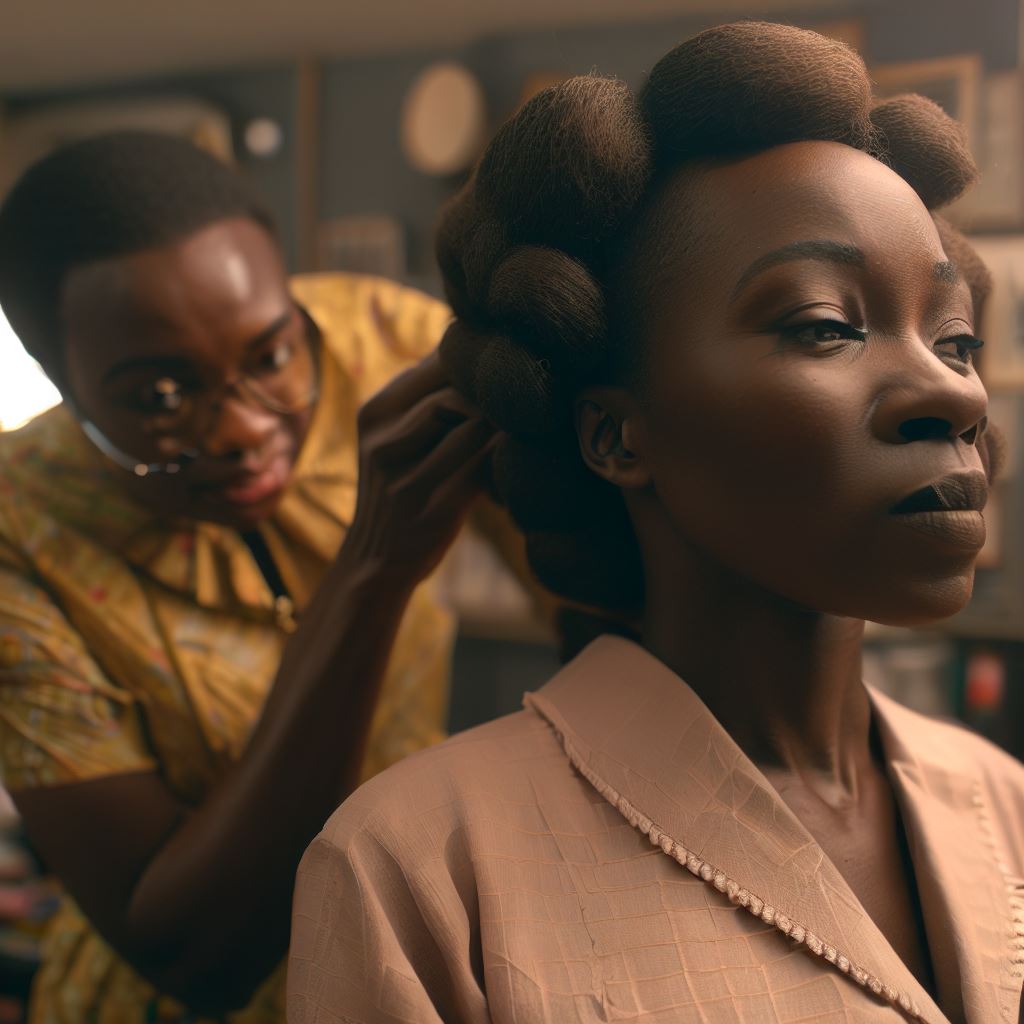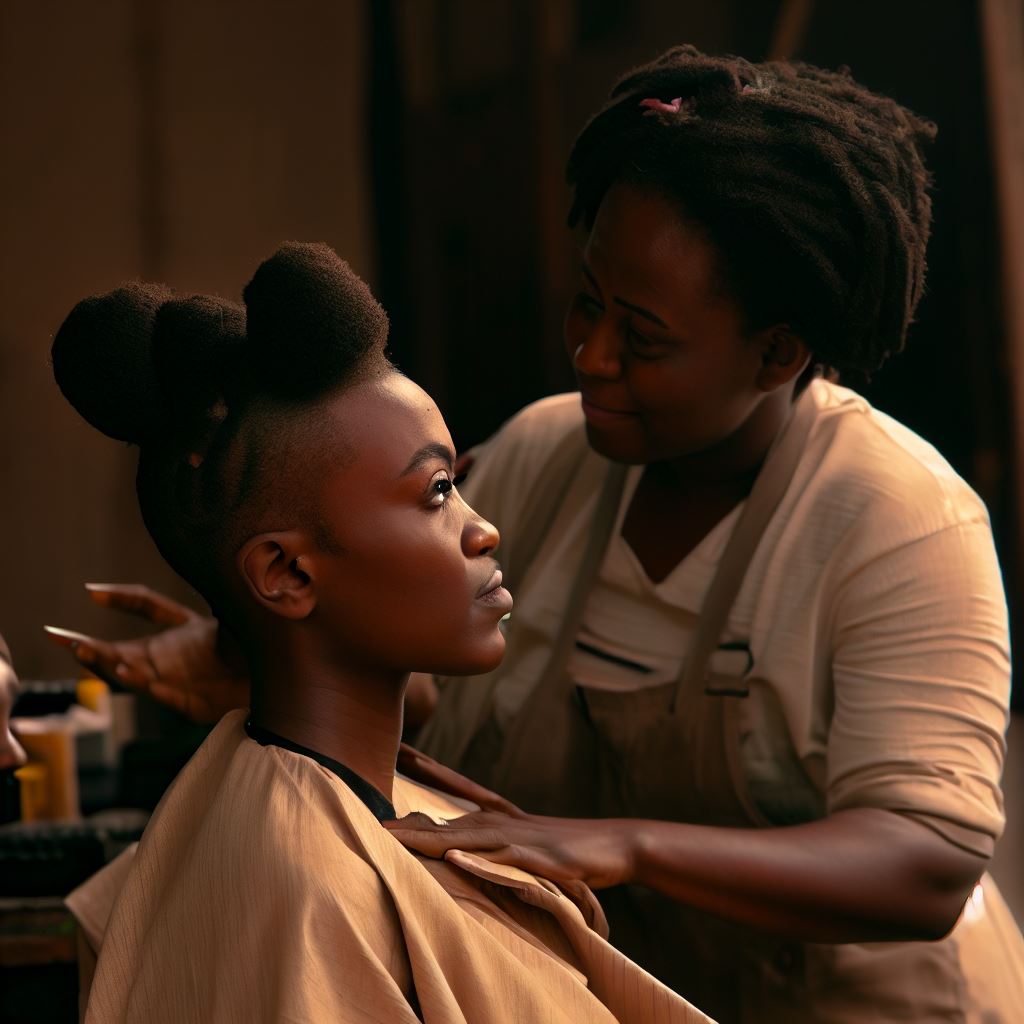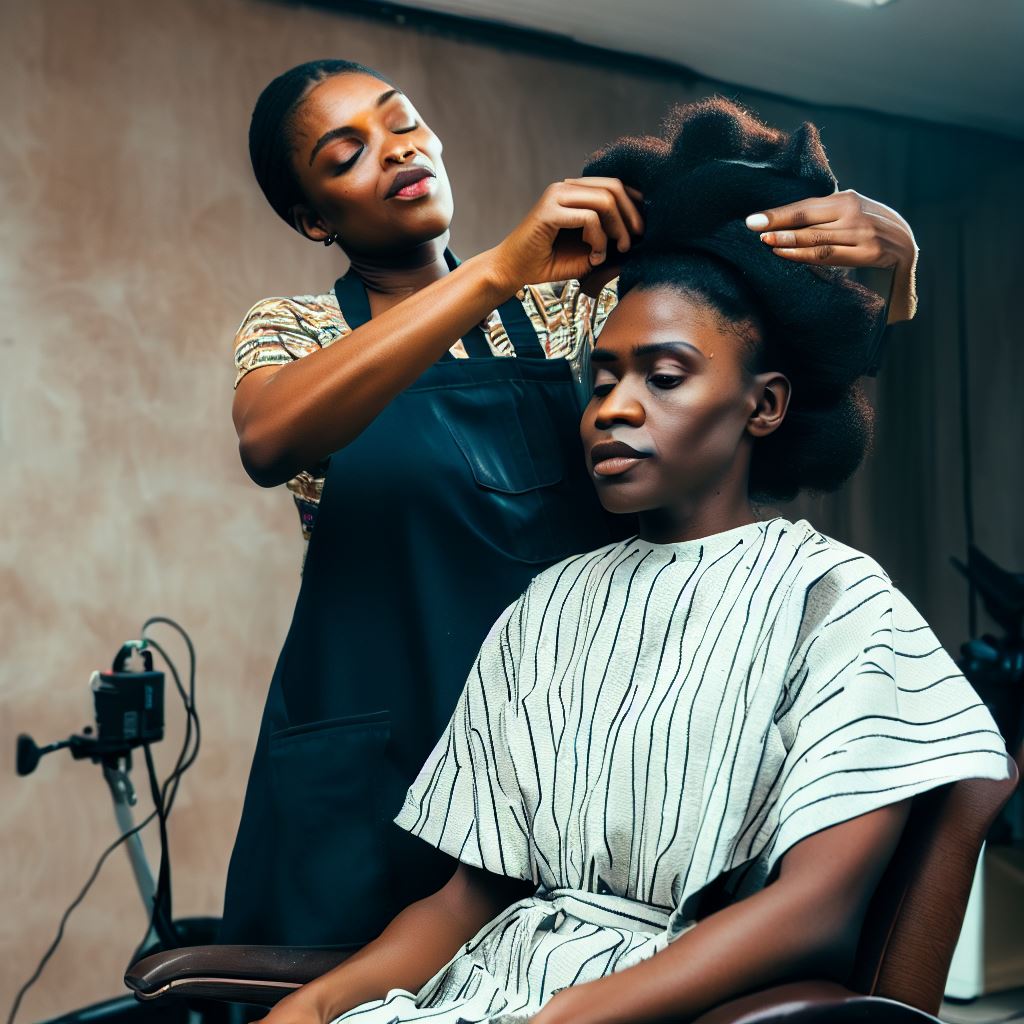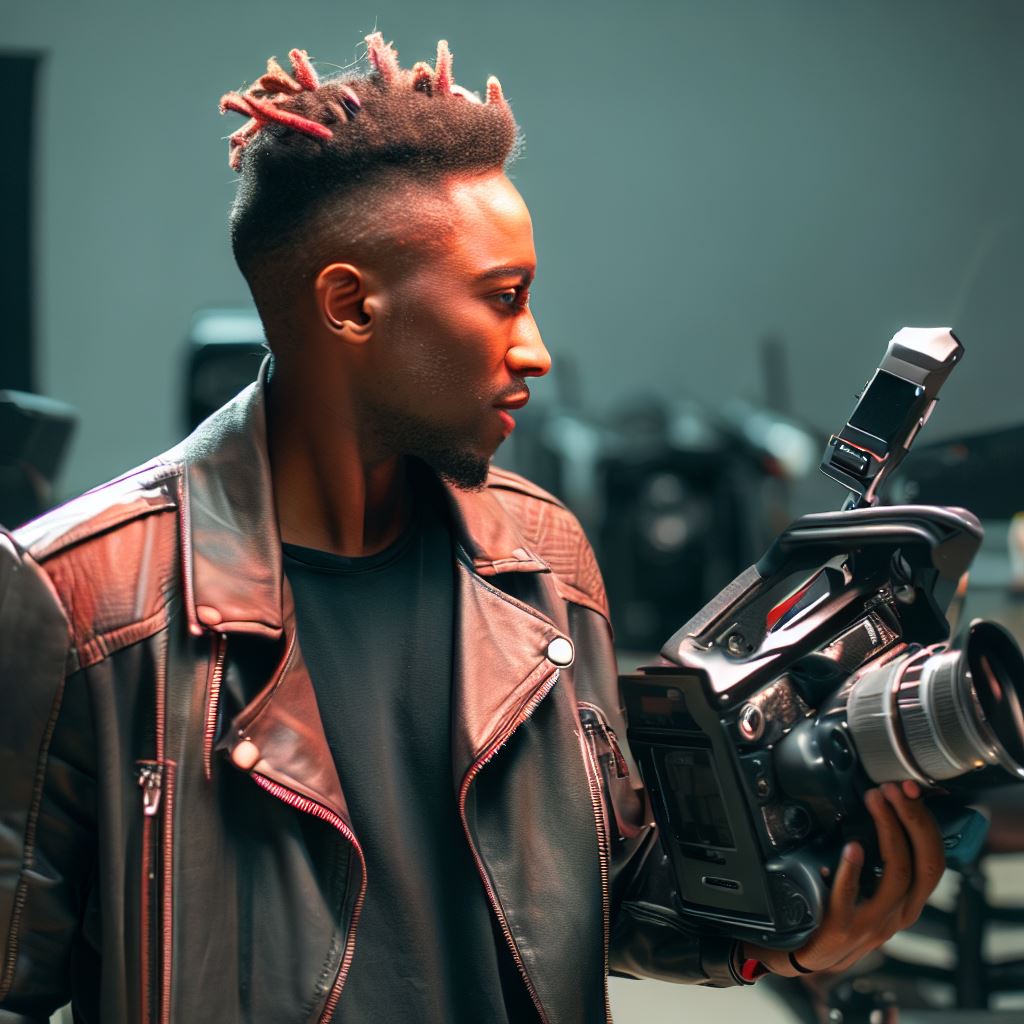Introduction
Let’s explore the changing landscape of hair styling in Nigerian films.
A. Explanation of Nigerian films and their growing popularity
Nigerian films, also known as Nollywood, have gained international recognition and have become one of the largest film industries in the world.
B. The importance of hair styling in Nigerian films
Hair styling plays a crucial role in Nigerian films as it helps to create the characters’ identities and convey cultural and societal messages.
Over the years, the art of hair styling in Nigerian films has undergone a remarkable transformation, evolving into a dynamic and influential facet of the country’s burgeoning film industry.
This evolution not only reflects changing fashion trends and societal norms but also underscores the growing importance of aesthetics and storytelling in Nigerian cinema.
Traditionally, hair styling in Nigerian films was often characterized by simplicity, reflecting the prevailing fashion and cultural norms of the time.
However, as the Nigerian film industry, popularly known as Nollywood, began to gain international recognition and influence, the role of hair styling within its productions underwent a significant metamorphosis.
C. Thesis statement
This blog post will explore the changing landscape of hair styling in Nigerian films and its impact on the industry.
In this exploration of the changing landscape of hair styling in Nigerian films, we will delve deep into the trends, techniques, and talents that have shaped this evolution.
We will unravel how hair stylists have become storytellers in their own right, using their craft to communicate characters’ personalities, emotions, and even historical backgrounds.
Traditional Hair Styling in Nigerian Films
A. Historical background of traditional Nigerian hairstyles
Nigerian traditional hairstyles have a rich history that dates back centuries.
These hairstyles were not only a form of self-expression but also a symbol of social status.
Various tribes in Nigeria had distinct hairstyles that represented their cultural heritage.
Some traditional hairstyles included braids, twists, and intricate patterns made with natural hair.
These hairstyles were often adorned with beads, cowrie shells, and other decorative elements.
Transform Your Career in Nigeria
Discover unmatched expertise with our personalized Career Consulting service. Navigate Nigeria’s job market with a strategy tailored just for you.
Get StartedTraditional Nigerian hairstyles were passed down from generation to generation, preserving the cultural identity.
B. Traditional hair styling techniques and tools used in Nigerian films
In Nigerian films, hairstylists use a variety of techniques and tools to create traditional hairstyles.
Braiding is a common technique used to achieve intricate patterns and styles.
Hairstylists often use natural hair extensions and sometimes add decorative elements like beads and shells.
African threading, a technique where thread is used to wrap and shape the hair, is also used.
Some traditional hair styling tools used in Nigerian films include combs, pins, and hair oils.
These techniques and tools are essential in authentically portraying traditional Nigerian hairstyles in films.
C. The significance of traditional hairstyles in representing cultural identity
Traditional Nigerian hairstyles play a crucial role in representing cultural identity in films.
They serve as a visual representation of the characters’ heritage, roots, and cultural backgrounds.
By incorporating traditional hairstyles, Nigerian films showcase the diversity and beauty of Nigerian culture.
These hairstyles tell stories and provide insight into the rich history and traditions of Nigeria.
They also help to break stereotypes and challenge perceptions about African beauty standards.
Traditional Nigerian hairstyles in films promote cultural appreciation and foster a sense of pride among Nigerians.
In short, traditional hair styling in Nigerian films offers a glimpse into the rich history and cultural identity of Nigeria.
These hairstyles, with their intricate patterns and techniques, serve as a visual representation of the characters’ heritage and roots.
They not only add authenticity to the films but also help to challenge stereotypes and promote cultural appreciation.
By showcasing the significance of traditional hairstyles, Nigerian films celebrate the diversity and beauty of Nigerian culture.
Read: How to Become a Successful Film Hair Stylist in Nigeria
Evolution of Hair Styling in Nigerian Films
A. Influence of Western hairstyles and trends in Nigerian films
Western hairstyles have greatly influenced the way hair is styled in Nigerian films.
Actresses in Nigerian films now embrace popular Western hairstyles such as afros, braids, and weaves.
These Western hairstyles are seen as fashionable and are preferred by many Nigerian actresses.
Western trends in hair styling have also influenced the use of hair accessories in Nigerian films.
Modern hair accessories like headbands, hair clips, and pins are now commonly used in Nigerian films.
B. Introduction of modern hair styling techniques and products
Nigerian films have witnessed the introduction of modern hair styling techniques and products.
Publish Your Professional Profile, Business or Brand
Showcase your expertise, gain trust, and boost visibility instantly on Professions.ng.
Publish NowHair styling professionals in the industry now have access to a wide range of styling tools and products.
Straighteners, curling irons, and blow dryers are now commonly used in Nigerian film sets.
Professional hair products like serums, hairsprays, and leave-in conditioners are now widely available.
The introduction of these modern techniques and products has elevated the quality of hair styling in Nigerian films.
C. Inclusion of diverse hair textures and styles in Nigerian films
Nigerian films now showcase a diverse range of hair textures and styles.
Afro-textured hair, kinky curls, and natural styles have gained popularity in Nigerian films.
Actresses are now embracing their natural hair and showcasing their unique hair textures on screen.
Traditional Nigerian hairstyles like Fulani braids and cornrows are also being featured in Nigerian films.
The inclusion of diverse hair textures and styles in Nigerian films celebrates the beauty of African hair.
The landscape of hair styling in Nigerian films has evolved significantly over the years.
The influence of Western hairstyles and trends, along with the introduction of modern techniques and products, has elevated the quality of hair styling in Nigerian films.
In addition, the inclusion of diverse hair textures and styles celebrates the beauty and versatility of African hair.
Nigerian films now showcase a true reflection of the changing trends and evolving styles in hair styling.
As the industry continues to grow, it is exciting to see how hair styling will further evolve and contribute to the storytelling in Nigerian films.
Read: The Role of a Film Hair Stylist in Nigeria’s Nollywood
Impact on Nigerian Film Industry
A. Enhanced portrayal of characters through their hairstyles
Hairstyles in Nigerian films have become a crucial aspect of character development.
The hairstyles chosen for each character often reflect their roles, personalities, and backgrounds.
This attention to detail adds depth and authenticity to the storytelling.
B. Economic opportunities for local hair stylists and salons
The rising demand for creative and unique hairstyles in Nigerian films has created opportunities for local hair stylists.
Local salons are now being approached by filmmakers to collaborate on projects.
The inclusion of professional hair stylists in film production has boosted the local economy.
C. Global recognition and appreciation of Nigerian film industry
The changing landscape of hair styling in Nigerian films has contributed to increased global recognition of Nigerian cinema.
International audiences are now appreciating the cultural and artistic aspects of Nigerian hairstyles.
This recognition has led to more opportunities for Nigerian filmmakers to showcase their work on the global stage.
In essence, the impact of the changing landscape of hair styling in Nigerian films is significant on multiple fronts.
The enhanced portrayal of characters through their hairstyles adds depth and authenticity to the storytelling, making the films more engaging and relatable.
The economic opportunities for local hair stylists and salons have increased, boosting the local economy and providing employment in the industry.
Furthermore, the global recognition and appreciation of Nigerian cinema have expanded, allowing Nigerian filmmakers to showcase their work on a global scale.
The changing landscape of hair styling in Nigerian films is not just a stylistic choice but a means of cultural expression and economic growth.
Read: The Cultural Significance of Film Music in Nigeria
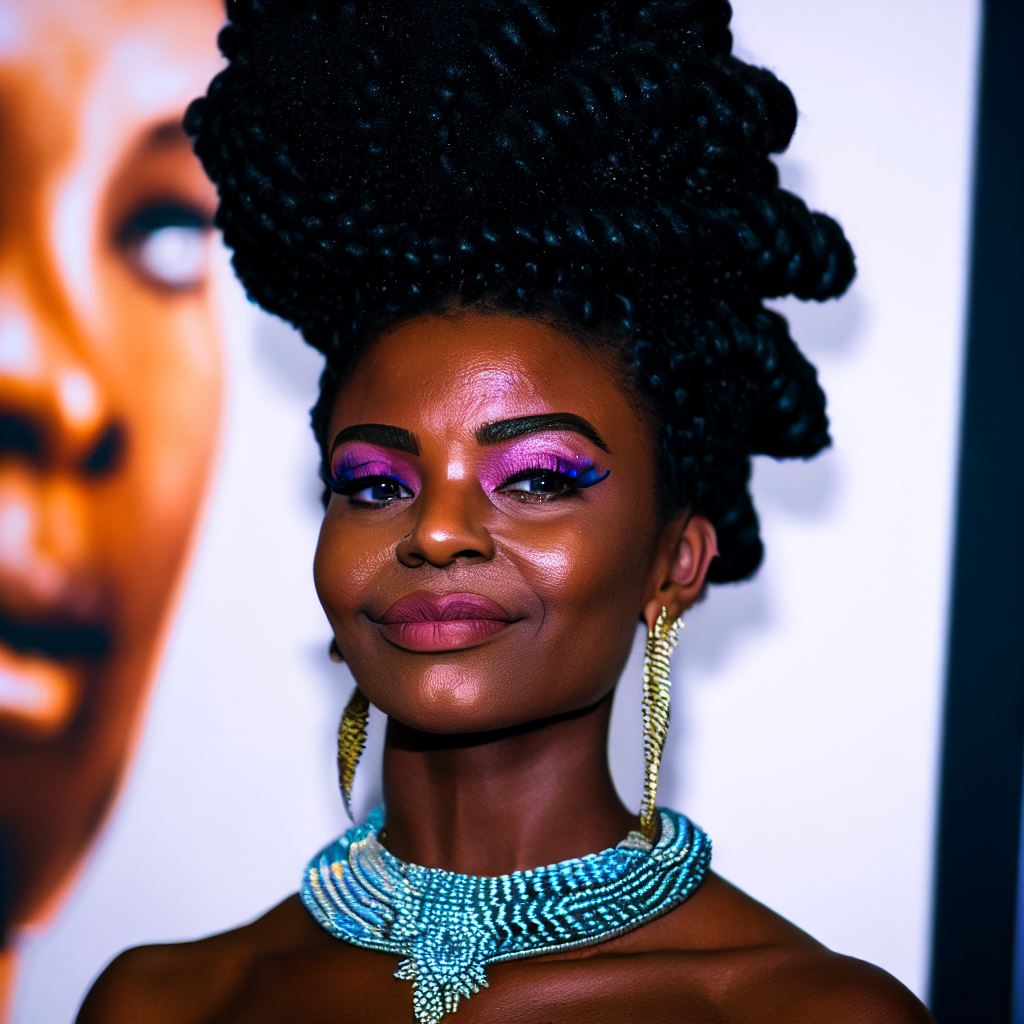
Role of Hair Styling in Storytelling
A. Use of hairstyles to depict characters’ personality traits and social status
In Nigerian films, hairstyles play a crucial role in shaping the audience’s perception of characters.
Intricate hairstyles are often used to emphasize a character’s high social status and wealth.
Characters with extravagant hairstyles are portrayed as powerful and influential individuals.
On the other hand, simple and modest hairstyles are used to depict characters of lower social status.
Hairstyles are utilized as tools to visually communicate a character’s personality traits and background.
B. Symbolism and cultural significance of different hairstyles in Nigerian films
Nigerian films use various hairstyles to symbolize cultural traditions and rituals.
Traditional hairstyles, such as the Gele or Bantu knots, are used to portray characters in touch with their heritage.
These hairstyles serve as visual cues to the audience about a character’s cultural identity.
Hairstyles can also signify significant events or milestones in a character’s life.
For example, a bride’s elaborate hairdo symbolizes her transition into marriage and adulthood.
Publish Your Professional Profile, Business or Brand
Showcase your expertise, gain trust, and boost visibility instantly on Professions.ng.
Publish NowDifferent hairstyles are used to convey characters’ religious beliefs, ethnic backgrounds, and regional affiliations.
C. Evolution of hairstyles to reflect character growth and plot development
In Nigerian films, character development is often reflected through changes in hairstyles.
As characters undergo personal growth or transformation, their hairstyles change accordingly.
For instance, a meek and introverted character may start with conservative hairstyles but transition to bolder styles as they gain confidence.
Hairstyle changes can signify a character’s journey, highlighting their experiences and lessons learned.
Moreover, plot development is enhanced by incorporating hairstyles that align with the storyline.
A rebellious character might have unconventional hairstyles, reflecting their defiance against societal norms.
In general, hair styling in Nigerian films goes beyond mere aesthetics.
It serves as a powerful storytelling tool, allowing directors to convey characters’ personality traits, social status, cultural significance, and character growth.
The use of diverse hairstyles adds depth and authenticity to the narratives, making Nigerian films visually captivating and culturally rich.
Read: Behind the Scenes: Life of a Nigerian Film Composer
Challenges and Controversies
In recent years, Nigerian films, commonly referred to as Nollywood, have seen a surge in popularity and international recognition.
Alongside this rise, there has been a significant transformation in the landscape of hair styling within the Nigerian film industry.
The ways in which hairstyles are depicted and utilized in Nigerian films have evolved, presenting both challenges and controversies.
A. Appropriation of African hairstyles by the Western media
One of the major challenges faced by the hair styling industry in Nigerian films is the appropriation of African hairstyles by the Western media.
African hairstyles, rich with cultural significance, have gained popularity worldwide.
However, the Western media often fails to credit or properly understand the origins and meaning behind these hairstyles.
This lack of acknowledgment can lead to misinterpretations and misrepresentations of African culture and identity.
B. Balancing cultural authenticity with creative expression in hair styling
Hair stylists face the challenge of balancing cultural authenticity with creative expression in their work.
They must find a way to incorporate traditional Nigerian hairstyles into modern film narratives.
While it is essential to respect and maintain the cultural integrity of these hairstyles, there is also room for artistic innovation and experimentation.
Striking this balance ensures that Nigerian films authentically portray their cultural heritage while still offering creative representations of hair styling.
C. Criticisms on exaggerated or stereotypical portrayals through hairstyles
Controversies arise when hairstyles in Nigerian films are criticized for their exaggerated or stereotypical portrayals.
Critics argue that these exaggerated depictions perpetuate stereotypes and limit the diversity of representations in the industry.
Certain hairstyles are often associated with specific characters or social classes, further reinforcing these stereotypes.
To overcome this criticism, it is crucial for the industry to explore a wider range of hairstyles and present more nuanced and diverse portrayals of Nigerian culture.
In brief, the changing landscape of hair styling in Nigerian films presents several challenges and controversies.
The appropriation of African hairstyles by the Western media without proper credit or understanding poses a significant challenge.
Balancing cultural authenticity with creative expression is another hurdle for hair stylists.
Additionally, the criticisms of exaggerated or stereotypical portrayals through hairstyles call for more diverse and nuanced representations.
Despite these challenges, the evolution of hair styling in Nigerian films offers an opportunity to showcase the rich cultural heritage of the country while embracing artistic innovation and pushing for more inclusive narratives.
Future Trends in Nigerian Film Hair Styling
A. Exploration of even more diverse and creative hairstyles
Nigerian films will continue to showcase a wide range of hairstyles.
More intricate and unique styles will be created to captivate audiences.
Hairstylists will experiment with different textures, colors, and accessories.
African heritage and cultural influences will inspire new and exciting hairstyles.
Actors and actresses will embrace their natural hair while still exploring creative options.
B. Integration of technology and special effects in hair styling
Technological Advancements will elevate Hairstyles in Nigerian Cinema.
Computer-generated imagery (CGI) will allow for the creation of fantastical and imaginative hairstyles.
Cutting-edge tech and materials for premium hair extensions and wigs.
Hairstyles will feature special effects for added visual impact.
Publish Your Professional Profile, Business or Brand
Showcase your expertise, gain trust, and boost visibility instantly on Professions.ng.
Publish NowHairstyles will become a tool for storytelling, creating visual metaphors and symbolism.
C. Collaborations between hairstylists and filmmakers to push boundaries
Hairstylists and filmmakers will work together to break traditional beauty standards.
Hairstyles are becoming a powerful narrative tool.
Experimental and avant-garde hairstyles will challenge societal norms and conventions.
Collaborations will lead to innovative techniques and concepts in hair styling for Nigerian films.
Hairstyles will become an integral part of character development and world-building.
In review, the future of Nigerian film hair styling is bright and exciting.
With an exploration of even more diverse and creative hairstyles, the integration of technology and special effects, and collaborations between hairstylists and filmmakers, Nigerian films will continue to push boundaries and captivate audiences with their hair styling choices.
The changing landscape of hair styling in Nigerian films reflects a larger shift towards embracing and celebrating African heritage and cultural influences.
As the industry evolves, we can expect to see even more innovative and groundbreaking hairstyles that enhance storytelling and contribute to the richness of Nigerian cinema.
Conclusion
Throughout the years, the hair styling techniques in Nigerian films have evolved significantly.
From traditional hairstyles to modern trends, hair has become an essential aspect of character development and storytelling.
Hair styling in Nigerian films serves as a powerful form of cultural expression, showcasing the diversity and richness of Nigerian traditions and customs.
It helps to depict characters’ identities, social status, and historical background.
The future of hair styling in Nigerian films seems promising, with continued exploration of different styles and increased focus on authenticity.
It will continue to evolve and contribute to the cinematic experience.

